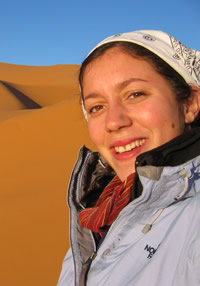2006.03.22: March 22, 2006: Headlines: COS - Morocco: University of virginia: Serving in the Peace Corps in Morocco, Mary Elizabeth Bruce learns — and lives — the meaning of the word “marhaba.”
Peace Corps Online:
Directory:
Morocco:
Peace Corps Morocco :
The Peace Corps in Morocco:
2006.03.22: March 22, 2006: Headlines: COS - Morocco: University of virginia: Serving in the Peace Corps in Morocco, Mary Elizabeth Bruce learns — and lives — the meaning of the word “marhaba.”
Serving in the Peace Corps in Morocco, Mary Elizabeth Bruce learns — and lives — the meaning of the word “marhaba.”

I’ve learned that some Moroccans live as I did in America, shopping at large fluorescent-lit supermarkets, sitting in mixed-gender cafes reading the newspaper, living in air-conditioned and heated houses and dreaming their dreams. But most Moroccans don’t. In villages like the one where I live, people shop at the souk, a large outdoor, weekly market. Yogurt, cheese and jam, among other products, are considered high-priced, luxury food items. Women do not go into cafes, as the public domain is strictly dominated by men, whereas the domestic sphere is that of women. It’s cold in the winter and hot in the summer, no matter what you do. And the largest social problem is chronic, widespread unemployment. A university degree is no indicator of employability. Poor dental health, diabetes and malnutrition plague the people. Many homes do not have running water, electricity or indoor latrines.
Serving in the Peace Corps in Morocco, Mary Elizabeth Bruce learns — and lives — the meaning of the word “marhaba.”
Letter from Morocco
Serving in the Peace Corps, M Bruce learns — and lives — the meaning of the word “marhaba.”
By Mary Elizabeth Bruce (Interdisciplinary – Poverty Studies ’04)
Posted 03/22/06
Bruce.
Bruce.
Photo courtesy of M Bruce.
I heard thunder last night. For the first time since Ramadan, I think. Don’t get me wrong; it rains here. It just doesn’t usually thunder.
It thundered this past summer, in the early evenings. It was about 110 degrees outside and even hotter inside my concrete house. During a sharquee, the hot wind would blow across the country, winding its way from the Sahara Desert, through the Atlas Mountains, past the olive groves, and find its way into my small apartment. Its breezes provided no respite from the swelter. A few drops of rain would fall, cooling nothing off.
But eventually it did cool off, and it kept getting colder. Now we’ve passed through most of winter, where the temperatures fell below 20 inside my uninsulated, unheated home. I sat wearing thermal underwear and three layers of fleece, but the windows were open to let in the sunshine, to warm my icy fingers.
Living without climatization is difficult. It affects your mood. It affects how long vegetables stay fresh. It affects when and how you can do laundry.
But in the small Moroccan village where I’ve spent the last 15 months, it’s just part of life. “Wesh drrk l’berd?” they ask, in Moroccan Arabic. “Does the cold hurt you?” “Imiq,” I reply, in Tamazeght, a Berber dialect of the Middle Atlas. “A little.”
When I joined the United States Peace Corps, just four months after graduating from the University of Virginia, I wasn’t quite sure what I was signing up for. I knew I wanted to see another part of the world and that Morocco, as a Muslim state in North Africa, would provide an invaluable opportunity to learn about Islam. I wanted to serve in a community in need, giving my time and energy in whatever manner the community needed most, but I knew I would probably learn more from them than I would be able to provide. After 17 months in-country (2.5 months of training are followed by 24 months of service in a community), I’m still learning.
I’ve learned that Morocco, as a country nestled among Africa, Europe and the Middle East, is an untidy amalgamation of cultures. Its citizens speak two different forms of Arabic, at least three different forms of Berber (the indigenous language), French, Spanish and English. It is predominantly Muslim, but churches and synagogues are still found in the cities, remnants of French colonization and a pre-Israeli Middle East. In a day, you can travel from the clean sands of the Sahara, through the snow-capped peaks of the Atlas Mountains and onto the bluffs and warm beaches at the Atlantic or Mediterranean coast.
I’ve learned that some Moroccans live as I did in America, shopping at large fluorescent-lit supermarkets, sitting in mixed-gender cafes reading the newspaper, living in air-conditioned and heated houses and dreaming their dreams. But most Moroccans don’t. In villages like the one where I live, people shop at the souk, a large outdoor, weekly market. Yogurt, cheese and jam, among other products, are considered high-priced, luxury food items. Women do not go into cafes, as the public domain is strictly dominated by men, whereas the domestic sphere is that of women. It’s cold in the winter and hot in the summer, no matter what you do. And the largest social problem is chronic, widespread unemployment. A university degree is no indicator of employability. Poor dental health, diabetes and malnutrition plague the people. Many homes do not have running water, electricity or indoor latrines.
So, I work with local associations on health, fitness and education initiatives. Students and I go to souk and hand out AIDS pamphlets. Neighborhood teachers and I go to women’s centers and talk about the importance of sanitation. University students and I tutor high school and middle school students in English and other subjects, hoping they will go to university, despite the high unemployment rate.
More than anything, in the past year and a half, I’ve learned that Moroccans, regardless of age or region, say, “marhaba,” “welcome.” And they mean it. This welcoming is sincere, and is meant to be extended to my entire family and all of my friends. My students’ families tell me “welcome,” and I go to their homes, drink sweet mint tea and eat chicken couscous. Neighbors tell me “welcome,” and I go to their homes, drink sweet mint tea and eat lamb stew. I’ve shared seats in taxis with women who tell me “welcome,” and I go to their homes, drink sweet mint tea and eat homemade pastries.
Now, when I meet others, I tell them “marhaba.” I invite them to my home in this small mountain village, where they can sit, drink mint tea and occasionally hear thunder.
Mary Elizabeth Bruce is serving in the Peace Corps in Morocco.
Links to Related Topics (Tags):
Headlines: March, 2006; COS - Morocco
When this story was posted in November 2006, this was on the front page of PCOL:





Peace Corps Online The Independent News Forum serving Returned Peace Corps Volunteers
 | Ron Tschetter in Morocco and Jordan
On his first official trip since being confirmed as Peace Corps Director, Ron Tschetter (shown at left with PCV Tia Tucker) is on a ten day trip to Morocco and Jordan. Traveling with his wife (Both are RPCVs.), Tschetter met with volunteers in Morocco working in environment, youth development, health, and small business development. He began his trip to Jordan by meeting with His Majesty King Abdullah II and Her Majesty Queen Rania Al Abdullah and discussed expanding the program there in the near future. |
 | Chris Dodd's Vision for the Peace Corps
Senator Chris Dodd (RPCV Dominican Republic) spoke at the ceremony for this year's Shriver Award and elaborated on issues he raised at Ron Tschetter's hearings. Dodd plans to introduce legislation that may include: setting aside a portion of Peace Corps' budget as seed money for demonstration projects and third goal activities (after adjusting the annual budget upward to accommodate the added expense), more volunteer input into Peace Corps operations, removing medical, healthcare and tax impediments that discourage older volunteers, providing more transparency in the medical screening and appeals process, a more comprehensive health safety net for recently-returned volunteers, and authorizing volunteers to accept, under certain circumstances, private donations to support their development projects. He plans to circulate draft legislation for review to members of the Peace Corps community and welcomes RPCV comments. |
 | He served with honor
One year ago, Staff Sgt. Robert J. Paul (RPCV Kenya) carried on an ongoing dialog on this website on the military and the peace corps and his role as a member of a Civil Affairs Team in Iraq and Afghanistan. We have just received a report that Sargeant Paul has been killed by a car bomb in Kabul. Words cannot express our feeling of loss for this tremendous injury to the entire RPCV community. Most of us didn't know him personally but we knew him from his words. Our thoughts go out to his family and friends. He was one of ours and he served with honor. |
 | Peace Corps' Screening and Medical Clearance
The purpose of Peace Corps' screening and medical clearance process is to ensure safe accommodation for applicants and minimize undue risk exposure for volunteers to allow PCVS to complete their service without compromising their entry health status. To further these goals, PCOL has obtained a copy of the Peace Corps Screening Guidelines Manual through the Freedom of Information Act (FOIA) and has posted it in the "Peace Corps Library." Applicants and Medical Professionals (especially those who have already served as volunteers) are urged to review the guidelines and leave their comments and suggestions. Then read the story of one RPCV's journey through medical screening and his suggestions for changes to the process. |
 | The Peace Corps is "fashionable" again
The LA Times says that "the Peace Corps is booming again and "It's hard to know exactly what's behind the resurgence." PCOL Comment: Since the founding of the Peace Corps 45 years ago, Americans have answered Kennedy's call: "Ask not what your country can do for you--ask what you can do for your country. My fellow citizens of the world: ask not what America will do for you, but what together we can do for the freedom of man." Over 182,000 have served. Another 200,000 have applied and been unable to serve because of lack of Congressional funding. The Peace Corps has never gone out of fashion. It's Congress that hasn't been keeping pace. |
 | PCOL readership increases 100%
Monthly readership on "Peace Corps Online" has increased in the past twelve months to 350,000 visitors - over eleven thousand every day - a 100% increase since this time last year. Thanks again, RPCVs and Friends of the Peace Corps, for making PCOL your source of information for the Peace Corps community. And thanks for supporting the Peace Corps Library and History of the Peace Corps. Stay tuned, the best is yet to come. |
 | History of the Peace Corps
PCOL is proud to announce that Phase One of the "History of the Peace Corps" is now available online. This installment includes over 5,000 pages of primary source documents from the archives of the Peace Corps including every issue of "Peace Corps News," "Peace Corps Times," "Peace Corps Volunteer," "Action Update," and every annual report of the Peace Corps to Congress since 1961. "Ask Not" is an ongoing project. Read how you can help. |
Read the stories and leave your comments.

Some postings on Peace Corps Online are provided to the individual members of this group without permission of the copyright owner for the non-profit purposes of criticism, comment, education, scholarship, and research under the "Fair Use" provisions of U.S. Government copyright laws and they may not be distributed further without permission of the copyright owner. Peace Corps Online does not vouch for the accuracy of the content of the postings, which is the sole responsibility of the copyright holder.
Story Source: University of virginia
This story has been posted in the following forums: : Headlines; COS - Morocco
PCOL35275
79


















